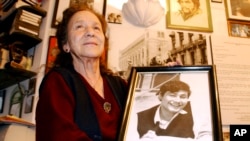Rosario Ibarra, whose long struggle to learn the fate of her disappeared son helped develop Mexico's human rights movement and led her to become the country's first female presidential candidate, died Saturday at age 95.
The National Human Rights Commission now headed by her daughter Rosario Piedra announced the death on its Twitter account, calling her a "pioneer in the defense of human rights, peace and democracy in Mexico."
She died in the northern city of Monterrey following several years of failing health.
Ibarra's son Jesus Piedra belonged to an armed communist group and disappeared, apparently at the hands of authorities, after being accused of killing a police officer.
Ibarra founded the Eureka Committee, a movement demanding information about the fate of her son and other disappeared persons, though his case was never fully clarified.
She was the first woman to appear on a Mexican presidential ballot in 1982, though she won relatively few votes for the Revolutionary Party of the Workers. She was twice a federal deputy and once a senator.
"We will always remember her most profound love for the children and her solidarity with whose who suffered because of the disappearance of their loved ones," tweeted President Andrés Manuel López Obrador, whom she considered a friend.
Still, even during López Obrador's administration, in 2019, she refused an honor voted by the Senate, saying she would only accept it when Mexico learns the truth about its disappeared, who now number nearly 100,000 — 98% of them from 2006 onward, during an era of cartel violence rather than "dirty war" politics.
"I don't want my struggle to be unfinished," she said then in a text read by her daughter because health prevented her from appearing.
Referring to the president, she added, "I leave in your hands the custody of so precious a recognition and ask you to return it to me with the truth about the whereabouts of our loved and missed children and relatives."
Her decades-long demands for information — as well as amnesty for political prisoners — took the form of marches, hunger strikes, visits to military prisons and to United Nations offices and made her a widely respected figure on the left.
When López Obrador alleged fraud in the 2006 presidential election that he very narrowly lost, he chose Ibarra to present him with a presidential sash of office in a ceremony declaring him "legitimate president."
After his universally recognized victory in 2018, Ibarra urged him in her message before the Senate "not to permit that the violence and perversity of the earlier governments continues to lie in wait."
She lamented that force disappearances continued in Mexico and called once more for progress:
"The families of Eureka continue today the same as a few years ago," she said in the letter read by her daughter. "The open wound will stop bleeding only when we know where our (loved ones) are."




